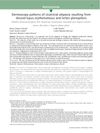 20 citations,
July 2006 in “Veterinary dermatology”
20 citations,
July 2006 in “Veterinary dermatology” Melatonin helped some Pomeranian dogs regrow hair, but it wasn't linked to estrogen receptors.
 136 citations,
April 2013 in “Clinical Cancer Research”
136 citations,
April 2013 in “Clinical Cancer Research” The drug IPI-926 is safe at 160 mg daily and may help treat certain tumors, especially basal cell carcinoma.
134 citations,
July 2020 in “Experimental dermatology” Hair follicles are normally protected from the immune system, but when this protection fails, it can cause hair loss in alopecia areata.
 66 citations,
February 2013 in “Pediatric Dermatology”
66 citations,
February 2013 in “Pediatric Dermatology” Dermoscopy improves diagnosis and treatment monitoring for children's skin infections, inflammations, and hair disorders.
2 citations,
February 2024 in “International journal of molecular sciences” Gut health affects skin diseases, and probiotics might help.
 18 citations,
April 2013 in “Inflammatory Bowel Diseases”
18 citations,
April 2013 in “Inflammatory Bowel Diseases” People with Inflammatory Bowel Disease often lose hair due to stress, medication side effects, or lack of nutrients, and treatment depends on the specific cause.
 21 citations,
September 2015 in “Journal of the European Academy of Dermatology and Venereology”
21 citations,
September 2015 in “Journal of the European Academy of Dermatology and Venereology” Yellow and orange colors are important for diagnosing certain skin conditions.
 34 citations,
October 2017 in “Archivos Argentinos De Pediatria”
34 citations,
October 2017 in “Archivos Argentinos De Pediatria” Alopecia Areata is a complex, unpredictable autoimmune hair loss condition with limited treatment options and a significant psychological impact.
 May 2023 in “Aesthetic Plastic Surgery”
May 2023 in “Aesthetic Plastic Surgery” The document concludes that there are various surgical techniques for hair restoration, their success depends on the surgeon's skill, patient's health, and quality of donor hair, and they can potentially improve the mental well-being of those with hair loss.
 June 2024 in “Al- Anbar Medical Journal”
June 2024 in “Al- Anbar Medical Journal” Acute telogen effluvium can be resolved by addressing causes, but chronic telogen effluvium is harder to treat.
 July 2018 in “Elsevier eBooks”
July 2018 in “Elsevier eBooks” Some drugs can cause reversible hair loss, but certain chemotherapy drugs may lead to permanent hair loss; drugs can also change hair color and texture.
 99 citations,
October 2006 in “BMC clinical pharmacology”
99 citations,
October 2006 in “BMC clinical pharmacology” Finasteride may cause slight depression and anxiety.
 August 2023 in “International journal of impotence research”
August 2023 in “International journal of impotence research” Many dermatologists believe finasteride can cause sexual side effects and counsel patients about them.
 39 citations,
January 2016 in “Journal of Cutaneous and Aesthetic Surgery”
39 citations,
January 2016 in “Journal of Cutaneous and Aesthetic Surgery” Injecting platelet-rich plasma during hair transplant surgery improves hair regrowth rate, speeds up skin recovery, and enhances hair quality.
 2 citations,
January 2014 in “Springer eBooks”
2 citations,
January 2014 in “Springer eBooks” The book details skin conditions in older adults, their link to mental health, cancer treatment importance, hair loss remedies, and managing autoimmune and itchy skin.
 14 citations,
December 2020 in “Journal of Investigative Dermatology”
14 citations,
December 2020 in “Journal of Investigative Dermatology” Aging causes changes in the scalp that can affect hair growth and lead to older-looking hair in women.
 192 citations,
January 2015 in “Journal of the American Academy of Dermatology”
192 citations,
January 2015 in “Journal of the American Academy of Dermatology” Targeted cancer therapies often cause serious skin problems that need careful management.
 December 1988 in “Journal of The American Academy of Dermatology”
December 1988 in “Journal of The American Academy of Dermatology” The meeting covered new findings in children's skin conditions and treatments, including the benefits of super absorbent polymer diapers.
 8 citations,
April 2019 in “Journal of the Endocrine Society”
8 citations,
April 2019 in “Journal of the Endocrine Society” Postmenopausal women with hyperandrogenism didn't have better metabolic health even after their testosterone levels became normal.
2 citations,
March 2021 in “Reproduction” Finasteride may affect male fertility by interfering with specific sperm signaling.
 9 citations,
July 2020 in “Experimental Dermatology”
9 citations,
July 2020 in “Experimental Dermatology” Topical L-thyroxine may help with wound healing and hair growth but should be used short-term due to potential risks.
![Comparative Oncology: Evaluation of 2-Deoxy-2-[18F]Fluoro-D-Glucose (FDG) Positron Emission Tomography/Computed Tomography (PET/CT) for the Staging of Dogs with Malignant Tumors](/images/research/d55cf8d9-d8ee-4735-9b38-42a266b4059d/small/24322.jpg) 17 citations,
June 2015 in “PLOS ONE”
17 citations,
June 2015 in “PLOS ONE” FDG PET/CT scans can change cancer treatment plans for dogs.
 3 citations,
May 1990 in “Journal of Steroid Biochemistry”
3 citations,
May 1990 in “Journal of Steroid Biochemistry” Some women with excess hair growth have a hormone condition that can't be diagnosed by blood or urine tests alone.
 8 citations,
June 2021 in “Acta dermato-venereologica”
8 citations,
June 2021 in “Acta dermato-venereologica” Trichoscopy is a reliable method for diagnosing hair-pulling disorder.
 24 citations,
May 2009 in “Veterinary Dermatology”
24 citations,
May 2009 in “Veterinary Dermatology” The document concludes that veterinary dermatologists need more experience and a better approach to treating skin diseases in nonhuman primates.
 July 2023 in “Al-Azhar Assiut Medical Journal”
July 2023 in “Al-Azhar Assiut Medical Journal” Trichoscopy helps diagnose and manage hair and scalp disorders in children.
 1 citations,
February 1988 in “The BMJ”
1 citations,
February 1988 in “The BMJ” The document explains different hair and scalp conditions, including common hair loss after pregnancy or illness, drug-induced hair loss, hereditary excessive hair growth, patterned baldness, autoimmune hair loss, and permanent loss due to skin disease, with generally limited treatment options.
 73 citations,
April 2010 in “Anais Brasileiros de Dermatologia”
73 citations,
April 2010 in “Anais Brasileiros de Dermatologia” Dermoscopy helps diagnose and monitor treatment for hair loss from scarring conditions like discoid lupus and lichen planopilaris.
 1 citations,
May 2021 in “Journal of Cosmetic Dermatology”
1 citations,
May 2021 in “Journal of Cosmetic Dermatology” Cosmetic foam product reduces hair loss and increases hair density in men.

Afro-textured hair is more fragile and prone to certain scalp conditions, requiring careful treatment and more research for effective management.



















![Comparative Oncology: Evaluation of 2-Deoxy-2-[18F]Fluoro-D-Glucose (FDG) Positron Emission Tomography/Computed Tomography (PET/CT) for the Staging of Dogs with Malignant Tumors](/images/research/d55cf8d9-d8ee-4735-9b38-42a266b4059d/small/24322.jpg)







